by Adela Lovric // Mar. 26, 2024
This article is part of our feature topic Grief.
In their theory of grievability, Judith Butler posited that grievable lives — those deemed worthy of mourning upon their loss — are those initially considered valuable. Conversely, an ungrievable life is one that never held recognition as a life to begin with. Butler considered this dichotomy from the perspective of those engaged in warfare, which serves as the rationale for targeting certain lives in the name of defending others. However, the question of whose lives are worthy of grief is also tied to broader questions of why certain groups are marginalized and what their outsider status means in times of crisis.
‘I Don’t Want to Be Just a Memory’ (2024)—Sarnt Utamachote’s latest film that premiered this year at the Berlinale—commemorates friends and queer community members lost to substance use and mental health crises. It also mourns the loss of safe spaces in Berlin, especially during the Covid-19 pandemic, which exacerbated vulnerability where protection and care are especially needed. Utamachote’s friends candidly share personal stories and opinions about Berlin’s club scene that are rarely heard in public. This becomes a means of grieving and healing and, as Butler would argue, carries a powerful potential to disrupt political hierarchies, especially those that created the problems affecting queer communities.
Like bioluminescent fungi that symbolize hope and growth in Utamachote’s short documentary, the protagonists of ‘I Don’t Want to Be Just a Memory’ transmute memories of death into a collective structure that sustains future living. The filmmaker and curator spoke to us about the making of the film, about the necessity of communal care and mourning, as well as how film, when done sensitively, can become a collective act of grieving.
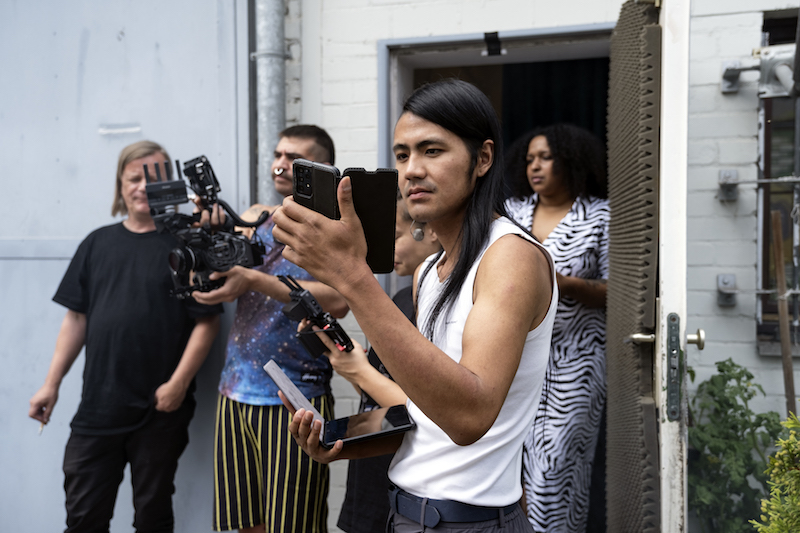
Sarnt Utamachote: ‘I Don’t Want to Be Just a Memory,’ 2024 // Photo by Ceren Saner
Adela Lovric: ‘I Don’t Want to Be Just a Memory’ highlights loneliness, emotional coldness, as well as the lack of care and true intimacy in Berlin’s club scene. While drugs offer a temporary escape, they ultimately deepen these struggles, leading to mental health crises, overdosing and often death. Within this context, why was it important for you to focus on acts of remembrance and grieving in the queer community?
Sarnt Utamachote: There are many cases of queer deaths, especially, for example, of the AIDS generation in the 1980s and 90s. Sometimes death reports were published in the mainstream media, but what’s mostly missing is: How do we grieve? How much do we learn? How can we move on?
That being said, there are also many of those who were missing from the list of grieved ones in the mainstream media and this includes not only trans people and people of color but also those in the underground. And so I believe that trying to remember and grieve for them — to remember their legacy and lessons they left behind — is important, also for myself and my friends. I want to honor the role that they played in the scene in creating safe spaces and memories. While they were alive, they created intimate space between the people they brought together. After they passed away, their queer funeral, despite not having their physical body with us, also brought us together.
The topic of substance use is important to highlight; these things make it easier for people to be vulnerable or be the new self they want to construct. It brings out angels and demons, but also sometimes memories. Some people I know saw shadows or apparitions of someone they love while under influence. This is crucial, as some of us forgot how to connect and be vulnerable without substances. Our culture around substance use in Berlin is so huge and often normalized that, as Gabri said in my film: “Some people feel attacked by my sobriety, thinking that my sobriety is like a judgement to them.”
I believe these deaths had less to do with the substances themselves and more with the cultures surrounding them: what true friendship or chosen kinship means. Are you left behind alone when you decide not to party or take any substances? Are you left behind when you overdose? Have you given enough care to people that you care about? Are we part of the same family? Isn’t family supposed to stick together through good and bad?
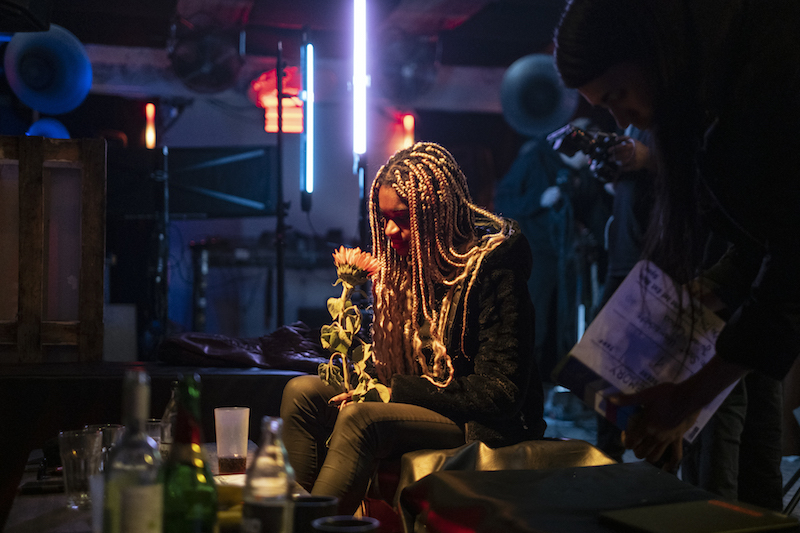
Sarnt Utamachote: ‘I Don’t Want to Be Just a Memory,’ 2024 // Photo by Ceren Saner
AL: Your film also addresses the concerning trend of queer safe spaces disappearing, exacerbated by the Covid-19 pandemic. Can you discuss any specific examples and what these losses mean for the community?
SU: For me, it’s just super simple: these are my friends, or people who offered me a shoulder when I had no one, offered me a job when I was “nobody” without a long CV. They trusted me truly — to be the photographer of drag shows at Kake, a former illegal space that closed in 2021, which was organised by my friend Gabri. There, I took a large collection of portraits. As underground photographers in Berlin, we become strange living archives. One of my pictures became the beginning point of the film: when R.L. runs towards the stage and we only see him from behind. A child running free in the world, screaming “Bitte!” to everyone. A paradise we thought we could live in forever. Covid-19 plus other measures against “social contamination” and financial burdens shut down these underground shelters. Squat house Liebig 34, for example, was also evicted, as police and politicians decided the rent, tax and property asset sales were more important than our lives.
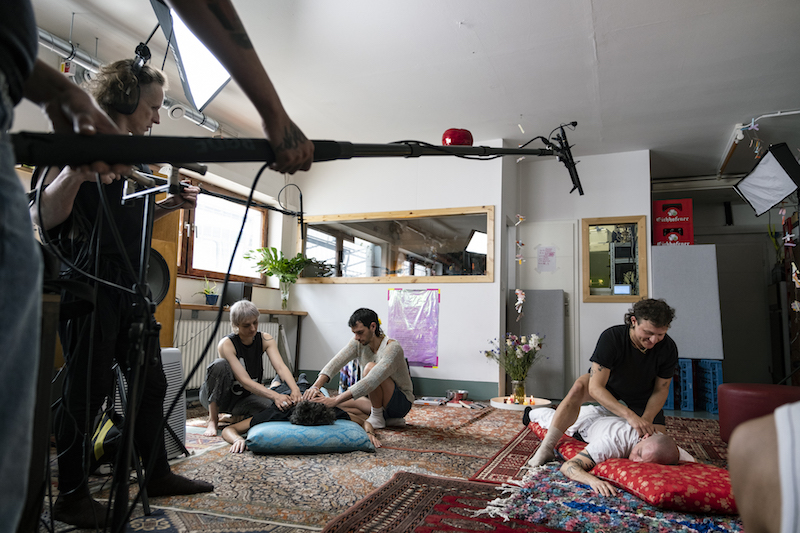
Sarnt Utamachote: ‘I Don’t Want to Be Just a Memory,’ 2024 // Photo by Ceren Saner
AL: Can you speak about the significance of this film as a collective effort to grieve — for you, the individuals engaged in the production as well as for the audience that might relate to the topics explored in the film?
SU: I realized while making it, that we, the party scene, rarely talk about grief. As Maria said in my film: “I was a bit disappointed that there was only silence and withdrawal [after the death], and you have all of these queer queer queer spaces, but they don’t sound queer to me.” We had forgotten our right to be together, to process loss and foster bonds. In order to move forward, this process—now hopefully advocated by this film—needs to happen. All our friends and spaces we lost can not be forgotten, they must become part of our future.
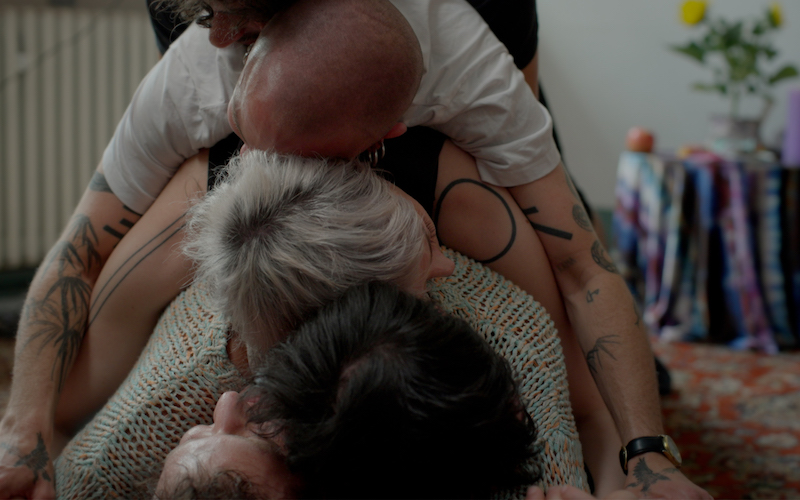
Sarnt Utamachote: ‘I Don’t Want to Be Just a Memory,’ 2024, film still // Courtesy of the artist
AL: The film includes your explicit directorial statement about ethical filmmaking. What does this kind of approach entail?
SU: Making this film required people from the scene, so the project became queer without having to force “diversity.” I never had an “open call for queer camera person” or whatever. These are my friends from the underground, these are people who lost someone or lost our space, and they happen to be trans, queer and full of talents that institutions rarely recognized. The film also became a safe space because of this; everyone knew each other already and felt so comfortable sharing things. We established an awareness team, who were responsible for full-time consent during the shoot and after the editing. All footage used in this film was consented to. Therefore, we could truly say it’s an ethical film.
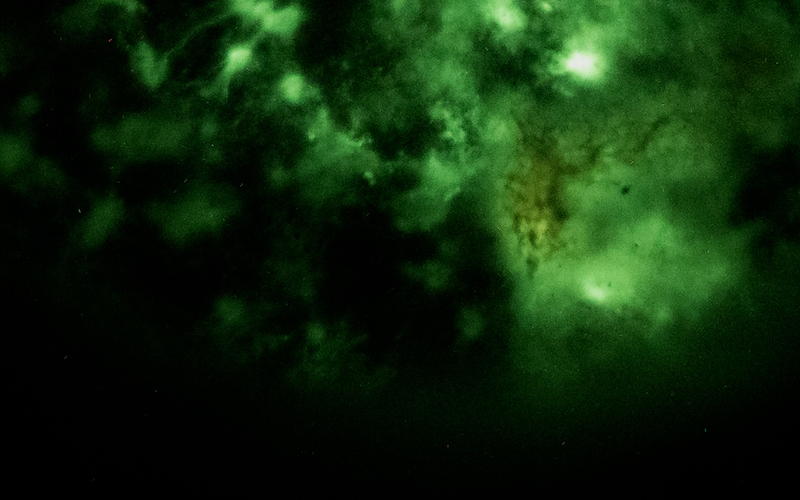
Sarnt Utamachote: ‘I Don’t Want to Be Just a Memory,’ 2024, film still // Courtesy of the artist
AL: In recent years, we’ve seen a widespread interest in mushrooms across art and theory; often expressed as a metaphor for the necessity of collaboration and a guide for coping in times of crisis. How do the topics explored in your film connect with ideas that come out of observing the world of fungi?
SU: I realised it got very trendy after Anna Tsing’s famous book. However, for me it came from some of the protagonists’ interests in picking mushrooms; and, later on, the cinematic search for “lost objects” in the fields. We found keys, or a lamp, or a cap, that belonged to someone we had lost. And by walking around, we ended up finding not exactly what we lost, but rather, what we could have. You know when you look for something but you find something else?
Mushrooms and their stronger-than-stone mycelium work like that—they transform dead bodies into materials for the future, they allow us to transform what we lost into what we could have. There is another motif of the sunflower. This comes from Orion, who appears in my film, and mentioned their love for Sarah Kane’s play that used the sunflower motif in a psychiatric ward. Sunflowers are, furthermore, used for funerals and gatherings; they are essential flowers in our Berlin scene.
When the email came from Berlinale confirming the acceptance of our film in November, I received the news within the same week that RTALIN, who appeared in the film and contributed his song ‘Saccharine,’ had also passed away. Later, we gathered at his queer funeral in Berlin, where so many people were brought together — more than a hundred showed up. I also met others whom I bonded with at parties and realised we had a common tie: people who we carry on in our hearts.
In the end, we lost many people, but we gained many as well. As long as you care for each other, the legacy of your kin will live on. As Rene said in the film: “I know she is there dancing with us in the club, taking care of us in some way.”





















